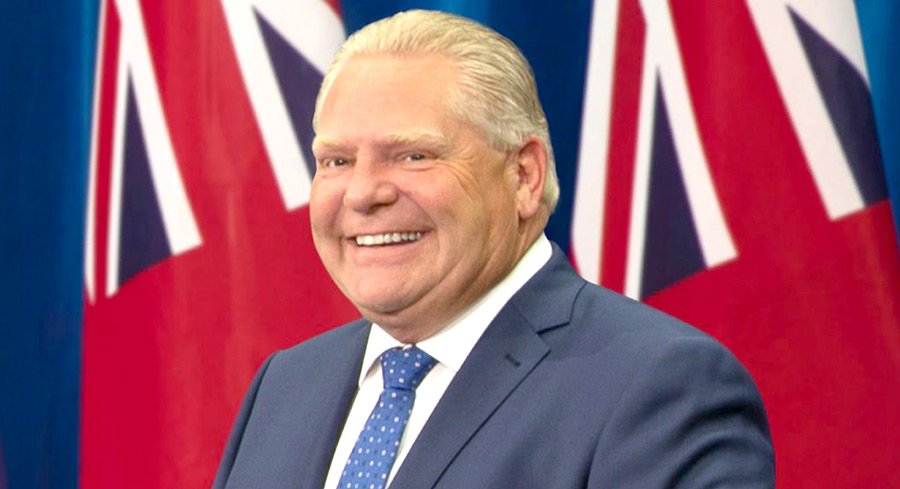TORONTO – The province has extended its state of emergency declaration until April 13 and has announced all public schools will be closed at least until May.
The moves were announced earlier this week as part of Premier Doug Ford’s daily updates on the province’s response to the COVID-19 pandemic.
Also announced was the immediate province-wide closure of all outdoor sports fields and playgrounds.
As of March 31, the total number of confirmed COVID-19 cases in the province is 1,966, including 33 deaths. Across Canada there are 7,708 cases and 90 deaths.
Schools
In a press conference on March 31, Ford announced all public schools will remain closed to students until at least May 4.
Private schools, licensed child care centres and EarlyON programs will remain closed until at least April 13 as part of the province’s emergency declaration (to be reviewed as that date approaches).
“The decision to extend school closures was not made lightly,” said Ford.
“We know from the medical experts that the next two weeks will be critical in the fight against COVID-19 and that’s why we’re taking further action to keep our kids safe and healthy by having them stay home.”
However, “At the same time, we cannot put the school year in jeopardy,” he added.
“That’s why we’re providing additional tools for at-home learning and ensuring students from kindergarten to Grade 12 to postsecondary education can finish their academic year and get the credits they need to graduate.”
The government announced on March 12 that all publicly funded schools would close for two weeks following the regularly-scheduled March break due to the COVID-19 pandemic. Classes were to resume on April 6, but Ford, during a March 23 press conference, said that is “not realistic.”
On March 31 education minister Stephen Lecce said the government “will do whatever it takes to keep students safe from COVID-19, which is why we have extended the school closure period and why we have unveiled a teacher-led program that keeps students learning while at home.”
He added, “By providing clarity for parents, enhancing support for students and enabling the teacher-student relationship, we are ensuring our children continue to safely learn – providing some sense of stability and hope for them amid this difficulty.”
Coinciding with its March 31 announcement, the province also launched the second phase of its Learn at Home online learning portal (ontario.ca/page/learn-at-home).
Government officials say the second phase will:
– reconnect students with teachers and other school staff, including mental health workers;
– re-establish teacher-led learning by grade groupings, with hours of work commensurate with student age/grade;
– leverage digital resources and identifying alternative forms of teacher-student connectivity, such as phone and mail;
– develop a program of training for educators to support them in virtual learning delivery;
– require final report cards for all students;
– prioritize and supporting students on track to graduate;
– distribute laptops and/or devices from schools as needed; and
– establish formal COVID-19 working groups with education sector unions to “find solutions in the support of students.”
“The province is taking extraordinary measures to stop the spread of COVID-19,” said Christine Elliott, Deputy Premier and Minister of Health.
“As we do, we need every Ontarian to continue to do their part by staying apart. Please stay home as much as possible and keep your distance from others if you must go out. Stay home, stay safe, lives depend on it.”
On March 21, the province launched Ontario Together, an online portal to help organizations work with the province to meet the challenges of COVID-19.
Officials say the government will “leverage partnerships with the telecommunication sector to provide innovative, low-cost and high-impact solutions to solve the equity challenges facing some students across Ontario.”
The plan will focus on:
– free or low-cost learning resources and supports for students, parents and educators;
– access to computers, tablets and portable wi-fi hotspots for families that need the supports; and
– other goods or services, to support mental health and students with special needs.
Emergency extended, outdoor amenities closed
Ford initially declared a state of emergency on March 17, effectively closing indoor recreational facilities, libraries, child care centres, theatres and cinemas, and bars and restaurants (except for takeout and delivery) and cancelling all church services and other gatherings of over 50 people (since lowered to five).
“We are facing an unprecedented time in our history,” Ford said at the time.
On March 30, one day prior to the expiration of that order, he confirmed it would be extended until April 13. Speaking at Queen’s Park, Ford said that the province will re-assess the declaration every two weeks.
Also on March 30, largely in response to many people ignoring local closures of municipal playgrounds and other recreational amenities, Ford announced the province-wide closure of all outdoor recreational facilities.
“I made a commitment to be open and up front about what we need to do as a province to beat this virus,” said Ford.
“Based on the best medical advice available, we are taking further steps today to protect the health and safety of all Ontarians … and extending our emergency orders to save lives.
“We all need to work together and do our part to stop COVID-19 by staying home, practising physical distancing, and avoiding social gatherings.”
This new order closes all public and private outdoor recreational facilities in Ontario. It includes playgrounds, sports fields, basketball and tennis courts, off-leash dog parks, beaches, skateboard and BMX parks, picnic areas, community gardens, park shelters, exercise equipment, and condo parks and gardens.
Green spaces in parks, trails and conservation areas not otherwise closed would remain open for walkthrough access, but individuals must stay at least two metres apart from others.
“We will continue to take decisive action to stop the spread of COVID-19 and protect Ontarians’ health and wellbeing,” stated Elliott.




